Harold’s Blog: Mayor Gets Vaccinated, Cary Invests $730,000 in Environmental Initiatives
Cary, NC — This week included our first quarterly meeting of the year.
Meetings & Recording with Triangle 411 Podcast
Monday I met virtually with the town manager for our weekly one-on-one. Our meeting focused on quarterly meeting topics which included The Center, redistricting, and the Human Relations, Inclusion, and Diversity Task Force.
Wednesday I did a taping for the Triangle 411 Podcast. They are working with Cary to promote our 150th anniversary. I talked about upcoming events which included:
- Virtual celebration on April 3rd (our day of incorporation)
- We Are Cary – 150 Years Later on April 9, 10, 17 which will be a series of workshops to create art to commemorate our anniversary.
- Your Tree, Our Tree – March and April, which is a tree giveaway with a marker to commemorate our anniversary
- A Day to Remember celebration – July 24
- Historical Play – September through October
- Gala – Masquerade on November 13
The podcast only took a few minutes to record.
Council’s First 2021 Quarterly Meeting
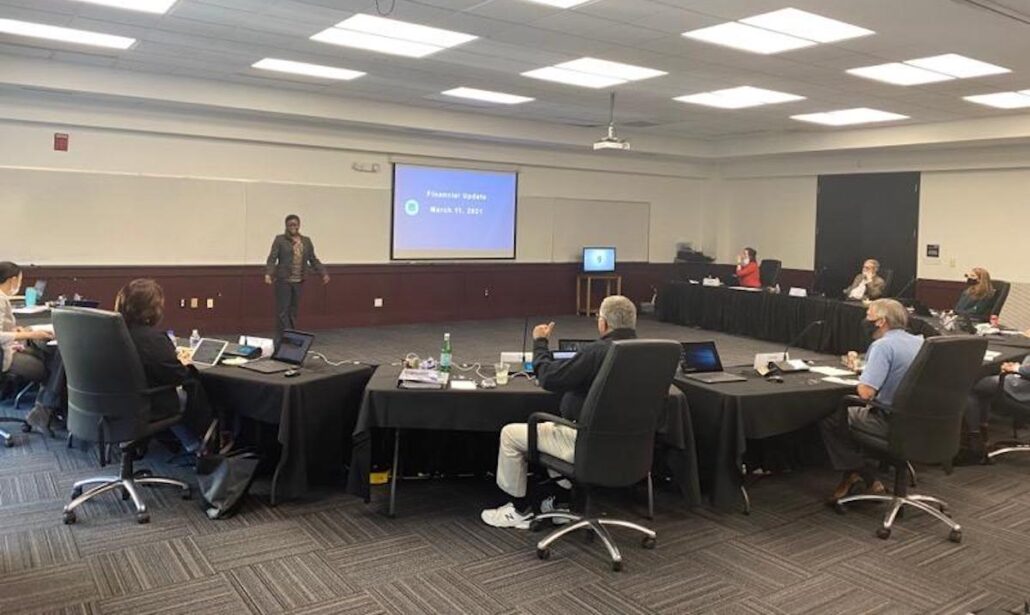
Thursday the council and staff held the first quarterly meeting of the year. Here are some of the notes I took on the various topics along with decisions. All decisions made at this meeting will have to be ratified at a future regularly scheduled council meeting:
Environment: Overall
- We are implementing some of the Environmental Advisory Board’s recommendations.
- At Jordan Lake regulations are maximized. We led with funding for watershed purchasing.
- We found out that many things we would like to regulate on solar is outside our authority.
- We have identified thousands of touchpoints related to trees.
Environment: Energy

- The future recreation center call “The Center” has solar integrated in the concept phase.
- A feasibility study for using solar at town hall is ongoing.
- Solar will be used at USA Baseball’s future indoor facility that houses an infield.
- The south Cary solar farm is in the 10th year of a 20-year lease. We have an option to buy.
- Residential solar has been rapidly increasing during the last 5 years. We project 300 additional homes by the end of this year.
- Duke Energy has agreed to participate with the town on programs including solar.
- We are using Dynamhex, which is a program that measures carbon emissions, with a goal of reducing emissions by 25% by 2025 and 100% by 2040.
Decision: Council agreed to pay $300,000 for solar at USA Baseball.
Environment: Transportation

- A liquid mixture is being applied to roads to restore the long-term effect. It has the added benefit of reducing temperature.
- The transit routes were expanded and changed in January.
- The town has purchased an electric garbage truck.
- The town continues to expand its green fleet. Currently there is a pilot program for Tesla’s as police cars. The total cost to upfit a standard car and a Tesla for policing are about the same.
Decision: Council agreed to use $150,000 of drug forfeiture funding for the Tesla pilot program
Environment: Tree Care and Planting
- The My Tree Our Tree program gave away 300 trees in 40 minutes. There are currently 400 people on waiting lists. These were 3-gallon trees about four to six feet in height. An additional 600 trees will be given out in the fall and another 600 next spring.
- The town used a grant to manage and acquire space along the White Oak greenway. It is possible that we will acquire additional land.
Decision: Council agreed to spending $200,000 in open space and the forestry plan.
Environment: Recycling and Composting
- A grant was received for food waste drop off.
- NCSU is partnering with the town on recycling. There is an AI program being used to determine what is in the recycling stream of materials. This will help in operational decisions.
Decision: Council agreed to spending $80,000 for metrics, benchmarking, and forecasting.
Environment: Education
- A communication and strategy team has been formed.
- Environmental issues are included in our legislative agenda.
- Chapter 8 of the Cary Community is being reevaluated for additional environmental initiatives.
Finance
- Sales tax and CARES reimbursements are up over projections while Parks and Recreation revenues are down due to facility closures. The Parks and Recreation revenues are down $4 million to date.
- We will be appropriating $100 million of the $225 million in bonds approved by voters in 2019. Those will be issued in September.
- Work in ongoing for the 2022 budget which takes effect on July 1st.
- Estimates are that we have lost $11 million from COVID related issues.
The latest COVID-19 relief plan would allow Cary to get up to $17.3 million. The money will be heavily restricted and regulated by the federal government.
Public Safety
- 320 town staff members out of 1200 have been vaccinated with 180 of those recently. Staff members are not forced to be vaccinated.
- Parks and Recreation staff are at about 50% vaccinated.
- Parks and Recreation programs are staring to open.
Redistricting
- There are 6 people on the redistricting team: 2 staff members and 4 consultants.
- Electoral districts are required to be substantially equal, that is, within 5%.
- The redistricting process will use the principles from 2011.
- Census data needed for redistricting comes out on September 30.
- Cary 2021 possible election dates include October 5, 2021, March 8, 2022, May 3, 2022, and November 8, 2022. The legislature will determine the election date before the end of June.
Cary 150
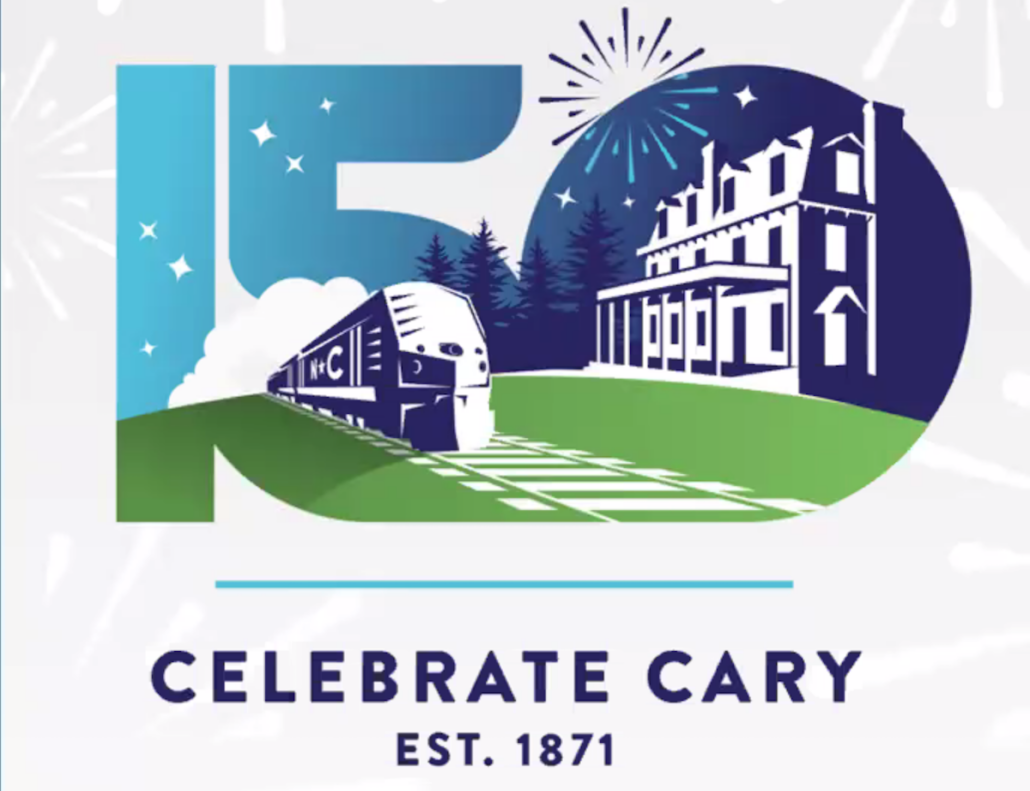
- All events related to Cary’s 150th anniversary can be found at https://www.Cary150.org.
- April 3rd there will be a “hype” video and a commemorative concert.
- Local breweries are collaborating for a commemorative brew.
- We are planning to have a July celebration and Lazy Daze this year.
- November activities will include a train car exhibit and a fountain in the Embassy Suites.
- There is a planned walking tour.
- There will be a time capsule commemorating this anniversary.
- There will be a 150-mile bike/walk celebration during Bike month.
Development Update
- The update is the 2nd quarter of the fiscal year: October – December.
- Staff received 30 requests and inquiries but only 1 became a rezoning.
- There were 51 development plans approved in Q2 which aligns with our five-year average.
- People have been getting cold calls to sell their homes.
- Residential alterations and additions are significantly up.
A downtown parking study is about done with recommendations coming soon.
Branding
- Logos will go to the Economic Development Committee in April with council adoption expected in the summer. Rollout will be late summer.
Diversity and Inclusion Task Force
- Task force members will be recruited starting in April.
- A diversity, equity, and inclusion staff member will be named in June.
- The town will form an Office of Diversity Equity and Inclusion in July.
- The first task force meeting is planned for August.
- The task force will be providing input as part of the Reimaging Policing Pledge (formerly the Obama Pledge) in September.
- Council will be updated quarterly on this issue.
The quarterly meeting was a little over 5 hours. The council-staff may decide to have the next quarterly meeting as an annual retreat.
Weekly Recap from the Metro Mayors
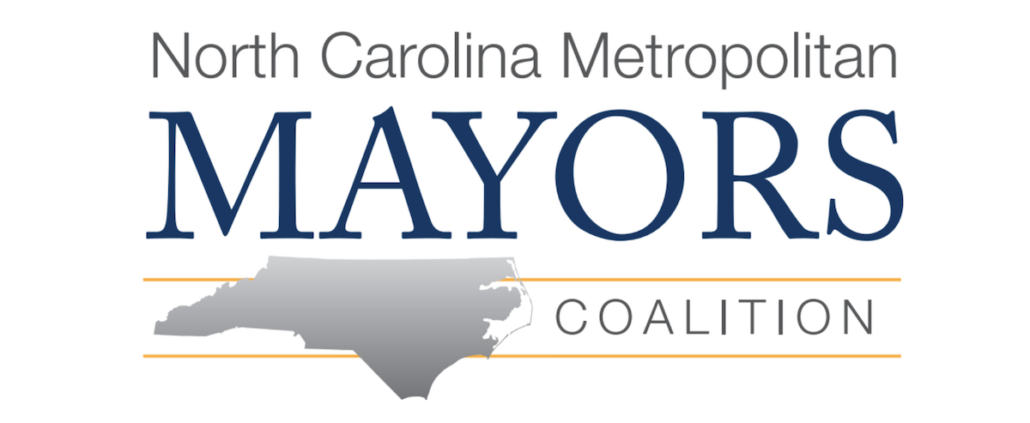
Friday I virtually attended a meeting of the North Carolina Metro Mayors. Here is a summary of that meeting from the Executive Director:
Topics this week included:
NC Legislature – focused attention on RE-OPENING schools – and agreement with Gov. Cooper (S220)
- Governor Cooper, Senator Berger, and Speaker Moore held a joint press conference on Wednesday announcing a compromise on reopening schools.
- The Reopen Our Schools Act of 2021, requires districts to open under Plan A (daily in-person instruction) for K-5 students and students in grades 6-12 with individualized educational programs. Plan A, Plan B (hybrid of in-person and remote), or a combination of the two could be offered for grades 6-12.
- Schools choosing to open under plan A for grades 6-12 must notify DHHS and describe their plan.
- The Governor would have the authority to close, restrict, or reduce operations within schools, but could only do so on a district-by-district basis.
- It passed unanimously in the House and Senate on Wednesday and Thursday and was signed by the Governor yesterday. The measure will go into effect on April 1.
Transportation
NC Chamber of Commerce Destination 2030
- Discussions about the long-term challenges to a gas tax-based revenue stream for transportation is on-going. Example – Amazon has plans to have over 100,000 ELECTRIC delivery vehicles on the road by 2030 – electric means NO GAS TAX, the primary transportation tax revenue from this enormous fleet of vehicles on our roads – a change that calls for a change in how revenue is generated to support our transportation system.
- Metro Mayors has been formally invited to join a NC Chamber of Commerce-led Coalition to address this topic. This will be an action item at an upcoming Executive Committee Meeting. PLEASE REACH out to your Chamber of Commerce to seek ways to work together to address this challenge to our transportation system.
Public Safety
Protect City Employees from Retaliation – H7
- This bill would require city councils to adopt an ordinance to encourage city employees to report illegal or improper conduct to their supervisors or other appropriate authorities and to protect that employee from workplace retaliation based upon that reporting.
- The bill could be heard in the House Judiciary 1 Committee next week (it was discussed, without a vote, in the committee this week).
- The NC Sheriff’s Association is opposed to the bill in its current form.
- Changes are expected to be made as this bill progresses and progression could be difficult due to the opposition.
- We will be monitoring the changes and activity on this bill closely. Let us know if your local delegation reaches out to you in regards to this bill.
Require Cooperation with ICE 2.0 — S101
- The bill would require that ICE is queried when an individual charged with certain offenses, is in custody and citizenship status is undetermined.
- It would require a judicial official to order that someone held in jail that is subject to a detainer and administrative warrant be held in custody for forty-eight hours or until ICE resolves the request.
- A similar measure passed the legislature in 2019 but was ultimately vetoed by the Governor. Unlike that legislation, this applies only to violent offenders.
- It passed on the Senate floor this week along party lines.
Economic Development & Local Revenues/Local Control
Nothing of note
Special Briefing
American Rescue Plan – H.R. 1319 (Subtitle M) 9901 Sec 603
Guest – Dave Gatton, U.S. Conference of Mayors, Director, Council on Metro Economies and the New American City; 202-861-6712; dgatton@usmayors.org
- The package includes $130.2B to local governments, split evenly between counties and cities.
- It is important to note this is an allocation, not a grant program. The US Dept of Treasury will distribute the funds. For CDBG entitlement cities the ARP funds will come directly to the city from US Treasury. For nonentitlement cities and towns, the State of NC will receive the funds as a pass through. The State of NC will have a limited amount of time to distribute to all of the nonentitlement municipalities (amounts determined based on a per capita formula) – sending funds to ALL nonentitlement municipal governments. A signed grant agreement will not be required to show how you will spend the money up front. But there will reporting requirements and certifications required for each city and towns to explain how the funds were used in accordance with [as yet to be determined] Treasury guidelines.
- The money will be received in two tranches:
- The first within 60 days of the President’s signature (he signed it yesterday)
- The second – one year after first allocation.
- Since this is an allocation, you will have the ability to broadly use the funds to fund a variety of projects or programs. However, the funds will have to be accounted for afterwards – the funds must be used in accordance with “yet to be issued” US Treasury guidance
- If funds are used –inappropriately (out of compliance with guidelines) the unit of local government could be required to REPAY the funds to the US Treasury.
- Treasury guidance is not yet available. AS your city begins contemplating the uses of the funds in your city, please review the very broad language in the bill and send your questions and ideas for using funds to Beau. NC Metro Mayors will work directly with the US Conference of Mayors to have your ideas and questions in included in direct discussions with the Dept of the Treasury as the Department develops guidelines.
Q&A Session
Q: Does ARP Sec 603 (local aid funds) expenditures have to be tied to COVID related lost revenue?
A: Not specifically – there are 4 major uses of the funds in the legislation (immediately below- emphasis added) – specific guidelines from US TREASURY are still to come:
Use of Funds —… a metropolitan city, nonentitlement unit of local government, or county shall only use the funds provided under a payment made under this section to cover costs incurred by the metropolitan city, nonentitlement unit of local government, or county, by December 31, 2024:
- (A) to respond to the public health emergency with respect to the Coronavirus Disease 2019 (COVID–19) or its negative economic impacts, including assistance to households, small businesses, and nonprofits, or aid to impacted industries such as tourism, travel, and hospitality;
- (B) to respond to workers performing essential work during the COVID–19 public health emergency by providing premium pay to eligible workers of the metropolitan city, nonentitlement unit of local government, or county that are performing such essential work, or by providing grants to eligible employers that have eligible workers who perform essential work;
- (C) for the provision of government services to the extent of the reduction in revenue of such metropolitan city, nonentitlement unit of local government, or county due to the COVID–19 public health emergency relative to revenues collected in the most recent full fiscal year of the metropolitan city, nonentitlement unit of local government, or county prior to the emergency; or
- (D) to make necessary investments in water, sewer, or broadband infrastructure.
Q: Initial guidance seems clear about wastewater/water but silent about streets, parks, economic development, transportation, etc. Do you think that’s intentional? What are your initial thoughts on how you weave in broader uses?
A: The guidelines from US Treasury will be critical to this question – the four categories are freestanding (use of the word “or”), so if you have an infrastructure project beyond the explicitly allow water, sewer and broadband projects, we may be able the negative economic impact explanation for a project. An example could be downtown business districts: Several businesses had to be closed due to the pandemic. Those closings impacted a broader set of businesses in the downtown district – the geographically defined area of negative impacts (downtown) could be the tied back to the COVID impact – and potentially related to a downtown enhancement project – like streetscape or parking, thus explaining the use of ARP local funds. The important measure of a project is providing a rationale that relates back to the pandemic – and its negative economic impact.
Q: Would a capital project like a fire station that has been planned, but cut because of COVID related budget cuts last year?
A: There are a number of questions to consider – Was that in the capital improvement plan before the pandemic and was its postponement a result of the pandemic? It seems highly likely that you would be able to do this, but we al need to wait for the guidance from the US Treasury.
Q: Cities may have used their fund balance/savings account to balance their budgets during the height of COVID economic downturn. Could ARP funds be used to restore the fund balance?
A: Unsure about this use. This should be a question that the NC Metro Mayors submits to the US Conf of Mayors to share and discuss with US Treasury as the Treasury develops the guidelines on spending the funds. The legislative language refers to the use of funds for the “provision of services,” so it may not be allowable to direct the funds specifically to the city fund balance, but we will need further guidance to determine this seemingly reasonable way to restore “lost revenue.”
The meeting concluded after about 45 minutes.
Sunday — Got the First Dose of Pfizer
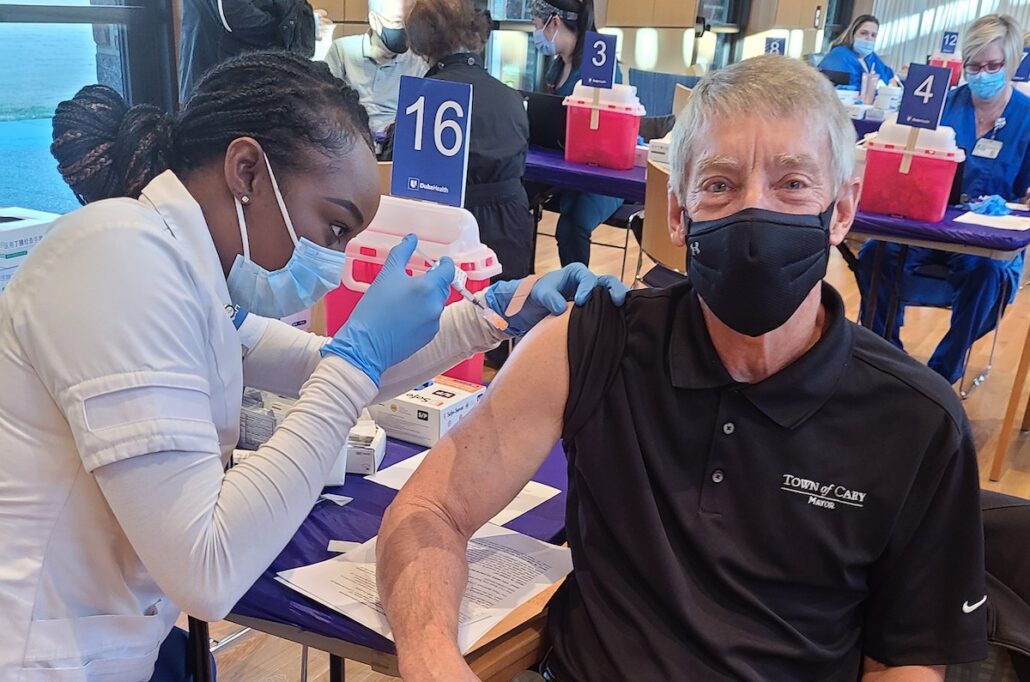
Sunday it was my turn to take the COVID-19 vaccination. I traveled to the Karsh center in Durham for my first dose of the Pfizer vaccine.
It is so very important that everyone get their vaccine when it is their turn so that we can all get back the days we long for. So remember, if it is your spot, take the shot!
Town Manager’s Report
The town manager, Sean Stegall’s report for this week includes:
Manager’s Message to Council
I appreciate each of you for taking time out of your day to provide valuable feedback on many important topics facing our community. Your perspective and experience are tremendously valuable and helps make Cary such a special place to live. We will be following up over the coming weeks with supplemental information to address the questions raised yesterday.
Stay safe and have a great weekend.
Sean
Legislative Update
NC H119 was filed on February 23, and while it’s subject to change, we will be watching it as it moves forward. A brief summary of the bill is included below:
- It would be a “deferment” of property tax
- The property owner must show a 25% revenue loss between 2019 and 2020
- Entitles owner to enter into a payment plan:
- Equal monthly installments
- Must pay by end of the year in which the taxes become delinquent
- Interest is waived
- Must apply by May 1, 2021
- Also permits tax assessors to modify the appraised value of real property to recognize changes due to COVID
- Also based on 25% loss in revenue and only affects valuation for a portion of the year impacted by COVID
Weekly Operational Report
The weekly operational report brings a close to the week’s organizational activities. Please take a moment to review the weekly operational report.
Departmental Updates
Included below is a summary-level overview of the operational activities continuing to take place during this health emergency.
- Yesterday, President Biden signed the $1.9 trillion American Rescue Plan Act into law. The bill was narrowly approved by the House on Wednesday with a vote of 220 to 211 and passed the Senate last Saturday with a 50 to 49 vote. Based on the funding estimates being circulated among Congressional offices, Cary is expected to receive a direct allocation of approximately $17.32 million. Keep in mind that final formula allocations will be developed by the US Department of the Treasury after the legislation is signed into law.
- A new development plan is under review for a 2.84-acresite at the corner of O’Kelly Chapel Road and Stone Croft Lane. The site will be divided into two parcels. One parcel will be for a new 3,600-square-foot convenience store with six vehicle fueling stations and the second parcel will be reserved for future development. This project was formerly known as the Amberly C Store. The previously approved development plan expired on October 16, 2019; therefore, a new development plan is required.
- Thanks to a great partnership between the NC Forest Service, NC State parks, Cary Fire, and the staff at Hemlock Bluffs, the 2021 controlled burn was conducted at Hemlock Bluffs Nature Preserve this week.
- In-person full day camps for traditional and year-round students in grades K-6will be offered starting March 29 through April 13. The Spring Day Camps will be offered at Bond Park Community Center, which was chosen based on location, indoor spaces, and proximity to outdoor amenities. Campers will enjoy full days of fun and creativity with COVID-19 protocols in place. Registration opens on March 15 for residents. Click here for more information.
- Parks, Recreation and Cultural Resources will be offering shelter reservations to the public beginning March 11. Reservation requests are submitted via myCary. Click here for more information.
- Transportation and Facilities partnered with SAS to determine the viability to record multiple high-definition video streams from the Traffic Signal Systems network cameras. Video was recorded and submitted to SAS for processing with results being finalized by mid-April.
- Rehabilitation of the Carpenter Water Tank located along NC 55 Highway is nearly complete. Both the interior and exterior of the 2-million-gallon elevated water storage tank has been repainted, leaving the 20-year-old tank looking brand new. With water demand still relatively low, the tank will be placed back into service in early spring.
My Tree, Our Tree Takes Root Quickly
The My Tree, Our Tree Program successfully launched this week.
Citizens claimed all 300 native trees in 40 minutes, nearly overwhelming the system with their enthusiasm. Over 200 citizens participated in the first two of three live webinars with Urban Forestry Manager, Katie Rose Levin, to hear tree planting and maintenance tips, ask questions, and get a sense of the tree pick-up process.
Dozens of participants shared their appreciation for the webinars with chat comments such as, “Thank you for a great program!” and, “Thanks for this opportunity and the expert support!” On Saturday, about 150 citizens will receive a tree planting kit and have their reserved tree placed in their car using a contactless system.
Well-informed and with a 150th commemorative tree marker, rain gauge, tree guard and gift certificate for a bag of mulch and topsoil in hand, these citizens will be well on their way to adding a tree to their landscape and to the community’s tree canopy. What a great way to celebrate Cary’s Arbor Day!
Reforesting North Cary Water Reclamation Facility
The fourth of five winter tree planting projects was completed this week. Two areas within the North Cary Water Reclamation Facility are now graced with over 80 native trees.
One site was planted with a mix of canopy and understory trees to reforest the area and a sloped area was also reforested with a similar mix of trees as well as native evergreens to screen the facility.
In addition to capturing carbon, providing wildlife habitat, and adding beauty, both plantings will help reduce long-term landscape maintenance costs.
Generator Delivery
On Monday, a new generator and enclosure was delivered to the North Cary Water Reclamation Facility. Twelve tractor trailers, three cranes, and a special crawler trailer was necessary to set the 16,000-gallon belly fuel tank base, generator, and enclosure.
The new generator will supply backup power to the new blowers that will provide diffused air for wastewater treatment.
Additional Information of Interest
We found the following articles to be particularly interesting this week and wanted to share with you for your reading pleasure:
- Vaccinated Americans, Let the Unmasked Gatherings Begin (but Start Small), The New York Times
- There Is No One Pandemic Anniversary, There are millions of them. The Atlantic
Addressing Concerns on Camps Reopenings & WakeMed Cross-Country Course
Staff responded to a citizen concern about the future of the WakeMed cross-country course which will be impacted due to the extension of Trinity Road.
Trinity Road needs to be extended to Chatham Street from Cary Towne Boulevard in part due to the Fenton Development but also to facilitate ingress and egress from those attending professional and international soccer matches at the stadium at WakeMed.
The town has been working closely with regional cross-country coaches and advocates and have tentatively developed a conceptual plan for a new course at Tom Brooks Park. There is no date yet for when the course will be moved so it will several years at least.
Staff also responded to a concern about the opening of town camps this spring and summer. The capacity per site and group size is determined by DHHS/CDC guidelines (i.e. Return to Camps, Strong Schools Toolkit) and the physical limitations per location.
Each location will have camps at maximum capacity based on the most current recommendations. Facility capacity numbers and group size may increase based on current state, federal, CDC and industry guidance at time of operation.
Originally, the town planned for 10 campers per group. We modified that to start registration at 12 per group. We could grow to as much as 15 for Summer Camps, depending upon what we learn in Track-Out Camp.
Staff is not aware of any organizations that are opening camps to pre-Covid levels or operations. For example, City of Raleigh, YMCA, Town of Holly Springs are all offering camps. Each one is applying Covid-19 safety protocols, which includes reduced group sizes and capacities.
Mayor’s Mailbox

Other emails from citizens this week included:
- Dozens of one-click politics cut-and-paste emails for me to vote against ordinances protecting discrimination against sexual orientation and gender identity. They claim it protects their religious freedom. (North Carlina municipalities derive their authority from the state legislature. We do not have authority to create ordinances on such matters without the legislature giving us permission. Does anyone remember HB2?)
- A claim that crime is rising in Cary (Currently this is no data to support this. I will gladly post that data once we have it. Staff is looking into getting data. Regardless, Cary remains one of the safest communities in the nation.)
- A complaint that we wasted money on the Mask Up campaign. They claim that data says masks really don’t help. (I believe the science. Masks DO HELP!)
- A complaint that I am “just as responsible, if not more so, for death and destruction as COVID” because of restrictions (Cary is following state and federal guidelines and has no local restrictions. However, we have closed facilities which are now gradually opening)
- A request to buy land for a park
Activities next week include staff meetings, a meeting of the Wake County Mayors Association, a meeting of the Capital Area Metropolitan Planning Organization’s Executive Board, and a virtual meeting with our delegation from the North Carolina legislature.
Well, that is all for this week. My next post will be on Sunday, March 21st.
Although I have Facebook and Twitter accounts those are not the best means of communications with me. Please send all Town of Cary questions or comments to Harold.Weinbrecht@townofcary.org and email personal comments to augustanat@mindspring.com.
From the blog of Cary Mayor Harold Weinbrecht. Images from Town of Cary.
All the Cary news for the informed Cary citizen. Subscribe by email.

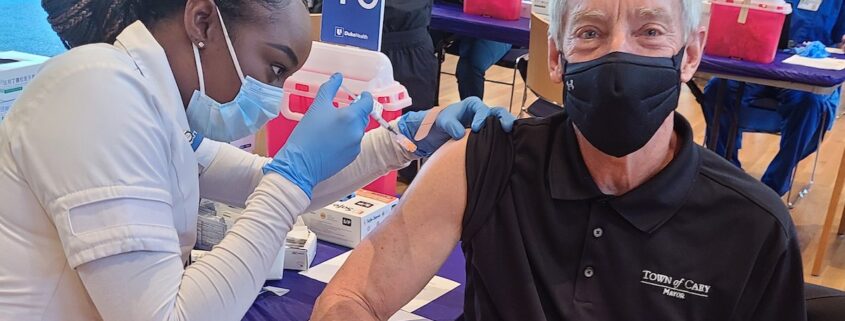
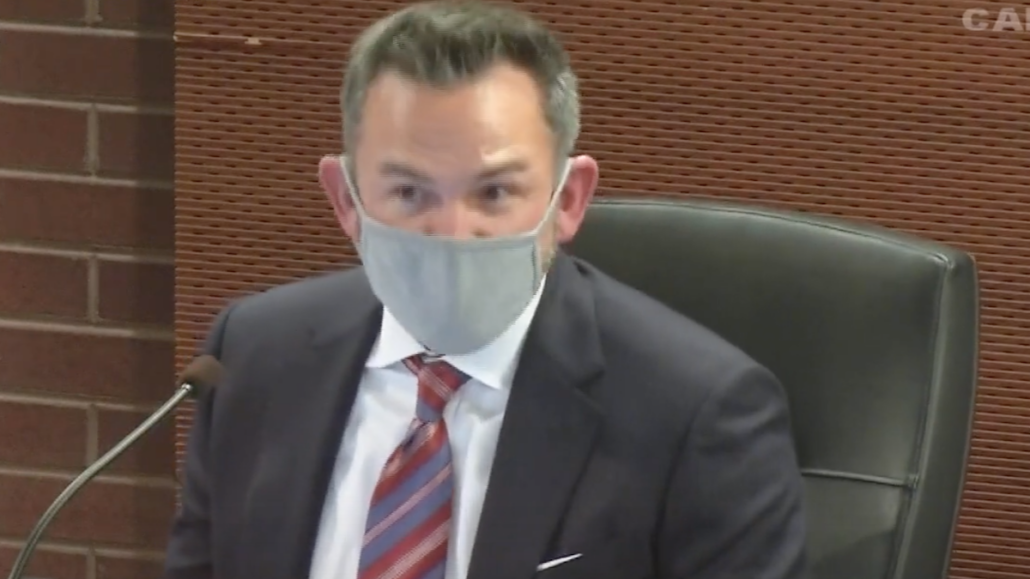
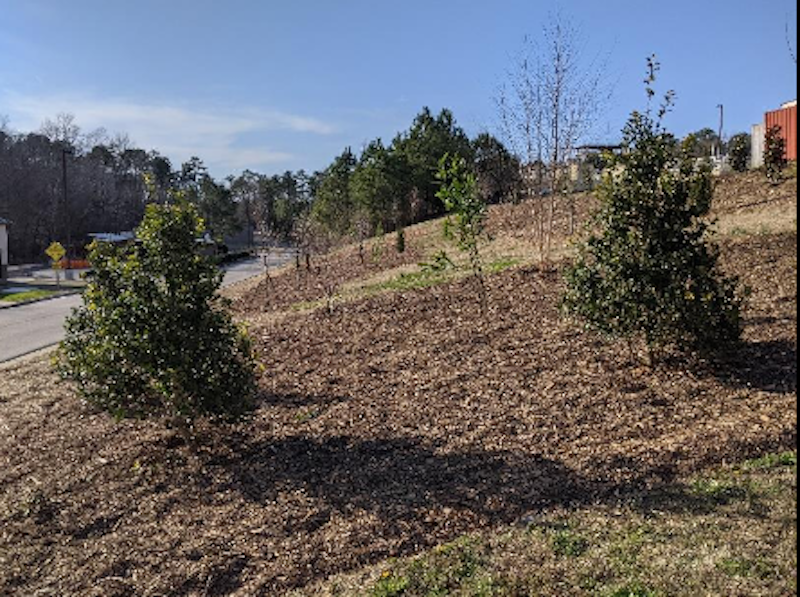



“A liquid mixture is being applied to roads to restore the long-term effect. It has the added benefit of reducing temperature.”
I think there are some words missing from this bullet point. Or maybe another entire sentence.
Let me understand this, the Town of Cary is using the Mayor’s place of employment, SAS, to do the traffic analysis instead of a known traffic analysis company?
SAS /is/ a statistical analysis company. A statistical analysis company whose expertise is sought after worldwide.
They are literally best-in-class for this sort of work. That the mayor works there is relatively irrelevant, since the office of the mayor has no involvement in the day to day operations of the Transportation and Facilities department.